Hollow Nickel Spy Case
© Brooke Clarke 2008 - 2022
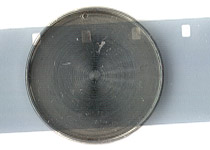
Background
Microfilm
VIC Cipher
Spy Coins
Microdots
Related
Links
Background
In 1953 a paper boy accidentally
received a hollow Jefferson Nickel as change from the wife of a
Russian spy (Wiki:
Able).
Inside was an encrypted message. The FBI worked
on cracking the message for four years with no success. It
wasn't until 1957 when defecting Russian spy master Reino Hayhanen
(
Wiki)
explained the complex paper and pencil system that the message was
read. Probably today the NSA could crack this code with
super computers, it was quite formidable in it's day.
In 1962 Abel was traded for U-2 pilot Gary Powers.
The 1959
movie "The FBI Story" (
IMDB) starring
James Stewart includes this case. The movie Bridge of Spies
(
IMDB) is about
both Able and Powers.
Microfilm
The message was on
microfilm with
the corners cut off to fit into the nickel. Note this is
much larger than a
microdot.
VIC Cipher
The cipher text on the microfilm
was:
14546 36056 64211
08919 18710 71187 71215 02906 66036 10927
11375 61233 65634 39175 37378 31013 22596 19291
17463 23551
88527 10130 01767 12366 16669 97846 76559 50062
91171 72332
19262 69849 90251 11576 46121 24666 05902 19229
56150 23521
51911 78912 32939 31966 12096 12060 89748 25362
43167 99841
76271 31154 26938 77221 58343 61164 14349 01241
26269 71578
31734 27562 51236 12982 13089 66218 22577 09454
01216 71958
26948 89779 54197 11990 23881 48884 22165 62994
35449 41742
30267 77614 31565 30902 65812 16112 93312 71220
62369 12872
12458 19081 97117 70107 06391 71114 19459 59586
80317 07522
76509 11111 35990 32666 04411 51532 91184 23162
82011 19185
56110 28876 76716 03563 28222 31674 39023 07623
93513 97175
29816 95761 69483 32591 97696 34992 61105 95090
24092 71008
90061 14790 15154 14655 29011 57206 77195 01256
69250 62901
39179 71229 23299 84164 45900 42227 65853 17591
60182 06315
65812 01378 14566 87719 92507 79517 99551 82155
58118 67197
30015 70687 36201 56531 56721 26306 57135 91796
51341 07796
76655 62718 33588 91902 16224 87721 23519 23191
20665 45140
66093 60959 71521 02334 21212 51110 85227 98768
11125 05321
53152 14191 12166 12715 03116 43041 74827 72759
29130 21947
15764 96851 20618 22370 11391 43520 62297 |
There are ten groups of five numbers per line.
Twenty full lines for 200 groups plus a partial line of seven
groups for a total of 207 groups.
There are 207 * 5 = 1035 numbers in the message.
There are some numbers that are questionable so this may have a
few errors.
An English version of the Russian Cyrillic plain text was:
1. WE CONGRATULATE YOU ON A
SAFE ARRIVAL. WE CONFIRM THE RECEIPT OF YOUR LETTER TO THE
ADDRESS `V REPEAT V' AND THE READING OF LETTER NUMBER 1.
2. FOR ORGANIZATION OF COVER, WE GAVE INSTRUCTIONS TO
TRANSMIT TO YOU THREE THOUSAND IN LOCAL (CURRENCY).
CONSULT WITH US PRIOR TO INVESTING IT IN ANY KIND OF
BUSINESS, ADVISING THE CHARACTER OF THIS BUSINESS.
3. ACCORDING TO YOUR REQUEST, WE WILL TRANSMIT THE FORMULA
FOR THE PREPARATION OF SOFT FILM AND NEWS SEPARATELY,
TOGETHER WITH (YOUR) MOTHER'S LETTER.
4. IT IS TOO EARLY TO SEND YOU THE GAMMAS. ENCIPHER SHORT
LETTERS, BUT THE LONGER ONES MAKE WITH INSERTIONS. ALL THE
DATA ABOUT YOURSELF, PLACE OF WORK, ADDRESS, ETC., MUST
NOT BE TRANSMITTED IN ONE CIPHER MESSAGE. TRANSMIT
INSERTIONS SEPARATELY.
5. THE PACKAGE WAS DELIVERED TO YOUR WIFE PERSONALLY.
EVERYTHING IS ALL RIGHT WITH THE FAMILY. WE WISH YOU
SUCCESS. GREETINGS FROM THE COMRADES. NUMBER 1, 3RD OF
DECEMBER. |
The plain text message also shown there has 767 characters, 919
characters if you count spaces. When you compare this with
the cipher text above you can see that the VIC cipher method
is very efficient.
Spy Coins
No
Hole Modern Hollow Nickel
|
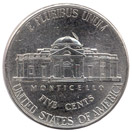
|

|
Tail
side where the joint is located
|
Tail
Head
Sperating
ring
|
Hollow
Nickel with hole in the "R" in TRUST (Jefferson is looking
at the hole)
|

|

|
16
mm film could be used for message
|
Set
with 0.017" driving pin and sewing needle (need thimble to
use)
|
I got the hollow Jefferson Nickel from
Spy-Coins. Their
stock Nickel does NOT have a hole in the "R" in TRUST but the
actual coin in the case used the hole to allow opening the
coin. The Spy-Coins Nickel comes with a brass ring with a
step that holds the heads side while allowing the tails side to
fall through when the combination is slapped down on a hard
surface a few times. Without the hole it's impossible to
tell the coin is hollow by visual inspection.
Spy-Coins also made the
"R" version for the same price as the no hole version. When
dropped a few feet onto plywood the nickel makes a sound related
to there being two parts, it sounds very different from the sharp
tap noise of a solid Nickel. Note the dates on these hollow
Nickels is long after the cold war so there's no mistake that they
are reproductions.
PS It's possible to tell the difference between a real and fake
coin by the sound it makes when "rung" like a bell by tapping it.
This coin, and probably the coin used in the Able case has no
keying to control the rotation when the two halfs are
assembled. But it would take a conscious effort to check the
relative rotation of heads vs. tails to see if it was wrong.
Film
I used <CTRL><Print Screen> on the cipher text above
and pasted it into PAINT. Then in Photoshop shrunk it to be
about 16 mm wide. That was too big to fit into the Nickel,
it needs to be shrunk a little more. But even with my old HP
LaserJet 4050 set to 1200 dpi you can NOT read the message.
It may be that one of the newer LaserJet printers with higher
resolution could actually make a readable small copy. If you
have a printer that can do it let me know.
There's a trade off between film speed and resolution.
What's called microfilm is very slow (needs a long Light * Time
product to expose) and has very fine grain. So to make the
message back in the 1940s you would use a camera loaded with
microfilm to photograph the message so it was scaled to fit the
hollow part of the coin. The actual message appears to be
larger than what could be done using a 16 mm camera. See
Microdots below.
Microdots (Wiki)
By making the message very small
it's easier to hide. Developed by German professor Arnold
Zapp.
Some references about Microdots:
CIA
Museum Tour - Center bay, left, bottom, right has small
photos of front and back of microdot camera. (Photo from
Wiki by means of the CIA.)
MI5 -
Spy Gadgets
in World War II: Microdots -
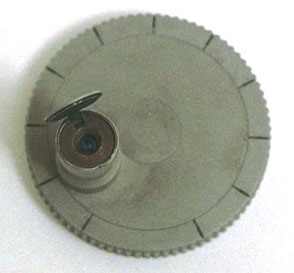 |
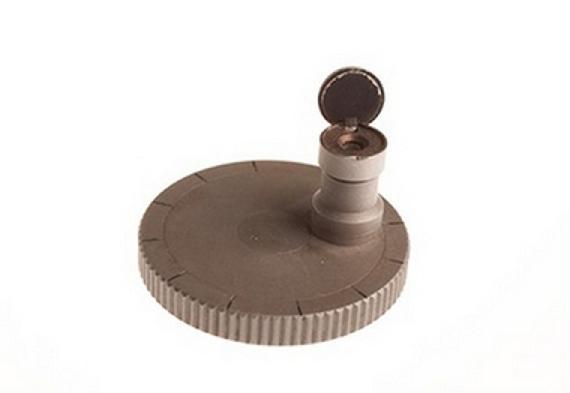
|
This
may be a 10 exposure camera where the lens is rotated
relative to the body. When not in use the lens may
be rotated to the 6:00 o'clock position in the photo so
it's not over one of the 10 message locations. The
shutter is the lens cap. Note that film grain size
and exposure time are related. Very fine grain films
take a lot of light to expose so a simple hinged lens cap
works fine. The amount of reduction improves with a
shorter focal length lens that may be why the lens appears
to be recessed, i.e. to be closer to the film.
There was probably a formula for using this camera.
For example a 100 Watt lamp some distance from a book page
sized subject. This camera some distance from
the page. Open lens cap for some number of minutes.
I've read that a hypodermic needle that's been cut off to
get a square end then sharpened to act like a cookie
cutter is used to cut the image from the film. But
that would not be easy since you would need to be able to
see the image and be sure you were not cutting off part of
it.
This camera may have used a "bullet lens".
|
KGB
Microdot Camera
|
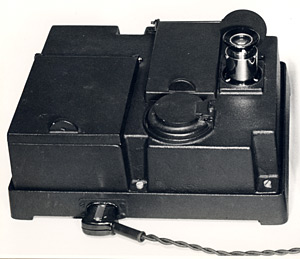
|
KGB micro dot
camera.. The multiple disks may each be a film
holder. Maybe the spy would unscrew one and move it
behind the lens. That could be done in the dark by
feel.
|
German camera held by MI5
|
Bullet Lens
From what I've learned those cameras use a "bullet lens".
It's just a glass rod flat and square on one end and with a
hemisphere on the other end.
Leeuwenhoek (
Wiki)
made his high magnification lenses simply from Borosilicate glass
rods by pulling a fine strand then forming a ball. I think
you can do a similar thing to form a hemisphere on one end of a
glass rod from a chemistry supply house (or eBay). Snapping
and grinding and polishing the other end would give you the flat
end. From there it should not be too hard to fabricate the
camera body. The key idea is no expensive optics are needed.
References
Wiki
Microdot
The Microdot: History and Application, William White, ISBN
0932572197, 9780932572196
Subminiature Photography, William White, ISBN 0240517105,
9780240517100
The Codebreakers: The Story of Secret Writing, David Kahn, ISBN
0684831309, 9780684831305
A G-man's Life: The FBI, Being "Deep Throat," and the Struggle for
Honor in Washington, W. Mark Felt, John O'Connor, ISBN 1586483773,
9781586483777
Spy book: the encyclopedia of espionage, Norman Polmar, Thomas B.
Allen, ISBN 0375702490, 9780375702495
Roosevelt's secret war: FDR and World War II espionage, Joseph E.
Persico, ISBN 0375761268, 9780375761263
Thwarting Enemies at Home and Abroad: How to Be a
Counterintelligence Officer, William R. Johnson, ISBN 1589012550,
9781589012554
The shadow war: German espionage and United States
counterespionage in Latin America during World War II, Leslie B.
Rout, John F. Bratzel, ISBN 0890932379, 9780890932377
Information Hiding: Steganography and Watermarking : Attacks and
Countermeasures, Neil F. Johnson, Zoran Duric, Sushil Jajodia,
ISBN 0792372042, 9780792372042
The puzzle palace: a report on America's most secret agency, James
Bamford, ISBN 0140067485, 9780140067484
Secret intelligence agent, Harford Montgomery Hyde, ISBN
0094638500, 9780094638501
The Super Spies: More Secret, More
Powerful Than the CIA, Andrew Tully, Published by Morrow, 1969
Secrets & spies: behind-the-scenes stories of World War II,
Reader's Digest, 1964, 576 pages
Anatomy of spying, Ronald Seth, Dutton, 1963,
The making of a spy, Peter. Way, Raymond Edward Palmer, ISBN
0717281167, 9780717281169
Related
M-94 Cipher Wheels
Micro Photography
Nikon Labophot Microscope
Cryptography - Crypto
Machines
FS-5000 Spy Radio
Links
CIA, Studies
Archive Index, Number
One From Moscow by David Kahn - This article is based on the
author's booklet Two Soviet Spy Ciphers (Great Neck, N. Y.: David
Kahn. 1960. L/C Card No. 60-16799.)
FBI, History,
Famous Cases, Rudolph Ivanovich Abel (Hollow Nickel Case)
-
The VIC Cipher
- used by Able in the Hollow Nickel Spy Case
Hand
Ciphers - One-time
Pad - The
Cipher Classics (with downloads) - not used in this case, but
probably by more modern spies
Wiki article on Abel
- Hollow
Nickel Case - Gary
Powers - U2
- 1960 U2
Incident -
Back to PRC68, Alphanumeric Index, Products for Sale, Crypto, Crypto
Patents, Military Audio, Squad Radio, Military
Information, Personal Home page
page created 13 Oct 2008.



